Earlier this month, I went on a fantastic six day painting adventure with artist friends Bill Cone, Paul Kratter, Ernesto Nemesio, Michele DeBraganca, Jeff Horn, Eric Merrell and Sergio Lopez to the Eastern Sierras - John Muir-Edgar Payne country. It was precisely the kind of uninterrupted painting time I so yearn for but don't very often get.
Lake Ediza was our destination, a steep hike up from about 7,000 feet to around 10,000 at the lake. As we hiked up from the Agnew Meadows pack station where we dropped off our gear for the mules to carry up, I was floored by the incredible views along the rocky trail as I breathlessly made my way up slower than my group, despite the conditioning/training I did a few months before the trip.
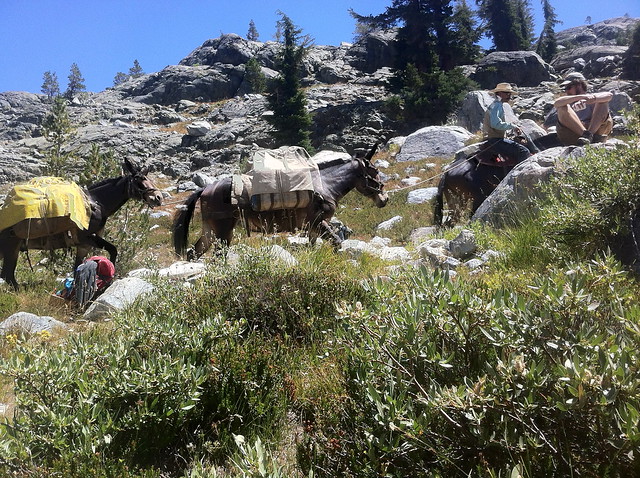
Our mule train arriving after a long hike up to Lake Ediza. Eric Merrell on the far right on top of a boulder.
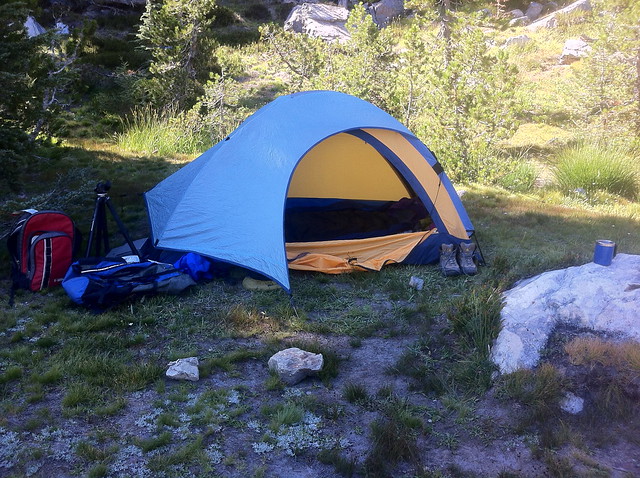
I set up my tent just under a tree, situated rather close to our cook's food storage/prep area due to the view of the Minarets from my tent. Given that we had a 4:00 am bear visit to the camp site, I think in the future I'd place my tent much farther away from the food source. I'm sure the view was just as magnificent a little further away.
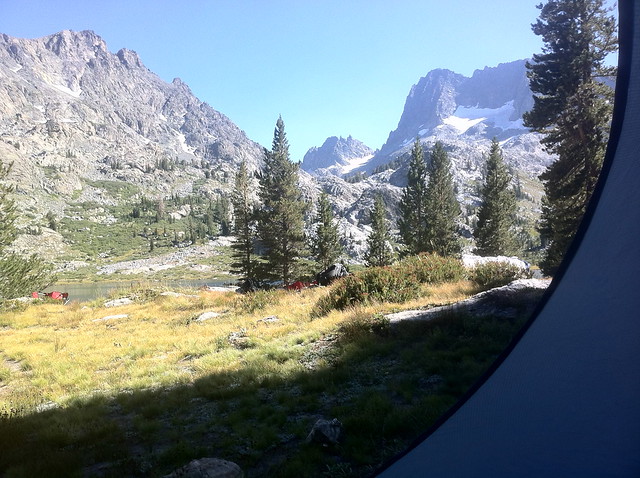
Zipping down the front flap to my tent each morning gave me the most amazing view! I did a few little pencil sketches from my tent in the mornings but mostly sipped coffee while staring at the mountains and feeling like all was right with the world. Probably not the most efficient use of my painting time, but deeply enjoyable nonetheless.
Before I went on the trip I planned out how I would approach the week of painting. I intended to sketch out a couple of long shots, a few medium and a couple of close up intimate scenes so that I could create a portrait of the area from large scale to the very small.
What I hadn't counted on though was how much the altitude seemed to factor into my experience within the first 24-48 hours. After we got up to Lake Ediza from a long and difficult climb up to almost 10,000 feet elevation, I found that even after a long rest and some water that my heart was beating quite fast. I tried my best to ignore it, but my worry distracted me and I didn't paint very well the first day.
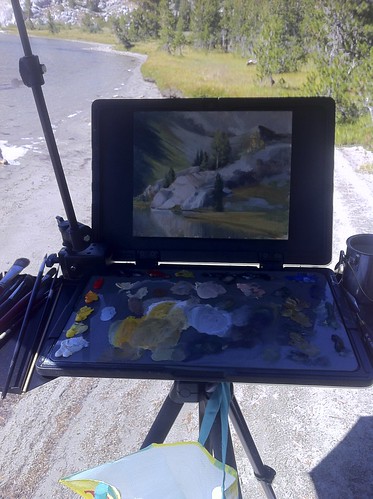
After the first 24 or so hours, my heart slowed to it's usual pace and I felt pretty comfortable. Still, I decided to stay close to camp to further acclimate to the elevation. While my camp mates were hiking up steep terrain in pursuit of painting gargantuan landscapes, I crawled along a stream bed close by looking for miniature wildflower compositions.
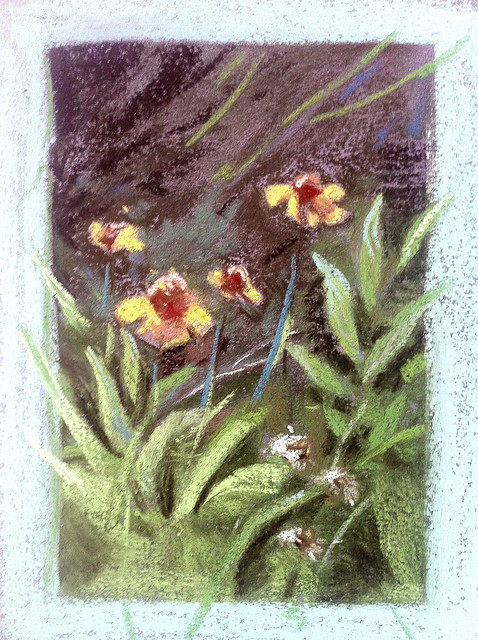
I attempted several minute scenes, but these two are my favorites of the lot. Most of these tiny compositions were along stream banks underneath tree growth bathed in beautiful cool sunlight with reflected light bouncing in and deep warm shadows. The pastel set I brought did not have a yellow that was as bright and pure as the yellow I saw in the light, so I tried my best to layer a few colors together and tried adding some transition color along the edges in order to brighten the color.
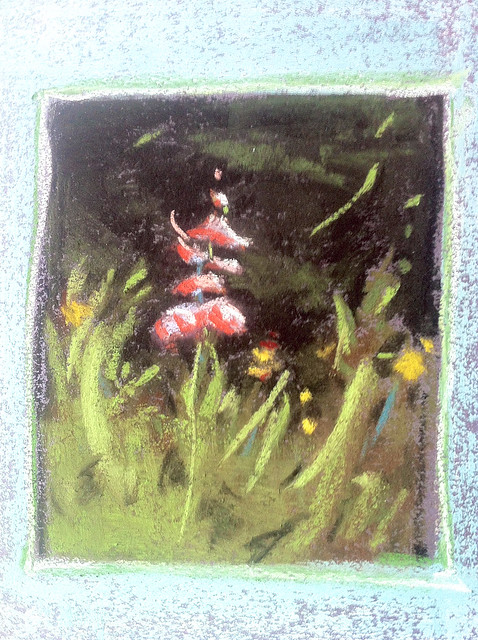
I also had some fun playing with the outside edges of the compositions, layering blue and accenting the edges with an emerald green. These little compositions reminded me a lot of the kind of watercolor paintings I did a lot of in my 20's. I would really like to get some hot press watercolor paper and do some more of these little flower studies.
In keeping my goals, I decided to venture further away from camp in order to attempt a long shot landscape. I found a bank of trees at the opposite end of Ediza near to where we hiked in and made myself comfortable by the lake shore in a shady spot. I always enjoy large view paintings but do find them daunting at times. Part of the reason for this is probably technical on my part; I feel the need to hang out in one area until I get the entire area correct in terms of value, hue, and saturation before moving on to anything else. This I am sure is due in part to the lessons I learned early on at the Palette and Chisel via Richard Schmid, who often lectured about the importance of getting everything correct within the focal point first. It is entirely possible that I misunderstood his point, but still, there it is, imprinted on my art mind forever and the way I've approached painting since I was 19.
Bill must have wondered what the heck was going on because at one point he came up to me and said, "Commit Julia! Commit!" I had to laugh because I knew exactly what he meant. From that point on I told myself over and over, "stop the bullshit and lay in some more color!!!" I did find it helpful to stop lingering as much as I was in my focal point and get some more color down.


What attracted to me to this grouping of trees was the deep shadow within the bank of trees at the bottom. I liked the way the shape looked and liked how it was juxtaposed against warm and cool greens in the light. I'm not sure this photograph picked up the variety of color in the shadow very well, unfortunately.
Also, while I painted the mountain in the far distance behind the bank of evergreens, I noticed that the colors were muted variations of reds and greens, a color scheme I saw near the foothills of Zion National Park in Southern Utah. I wondered if these mountains have some of the same elements.
Switching to oil, I wanted to make a few studies of the light on rocks down by the water. I was attracted to the color in the shadows on the rocks - just jam packed with rich color that made it really fun to paint.
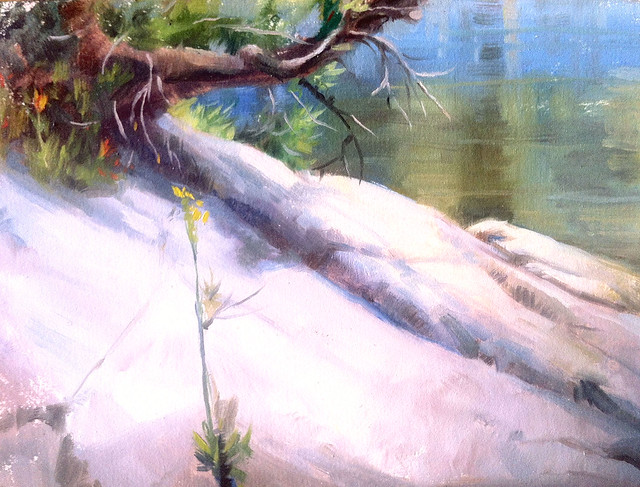
However, this simple study was more challenging than it might look. I'd look down to mix up some color, look up, and all of the sudden the temperature in the light was completely different! I decided it was probably due in part to the reflection of the shimmering light coming off of the water from Lake Ediza. This one is also on Arches oil paper. I layered the paint thicker in this study to compensate for the absorbency of the paper which seemed to make my values at least a full value darker about ten minutes after I laid down the paint. I did another few studies of the Minarets but became frustrated with the oil paper. I think I'll switch back to my usual L219 new traditions panels for oil studies.
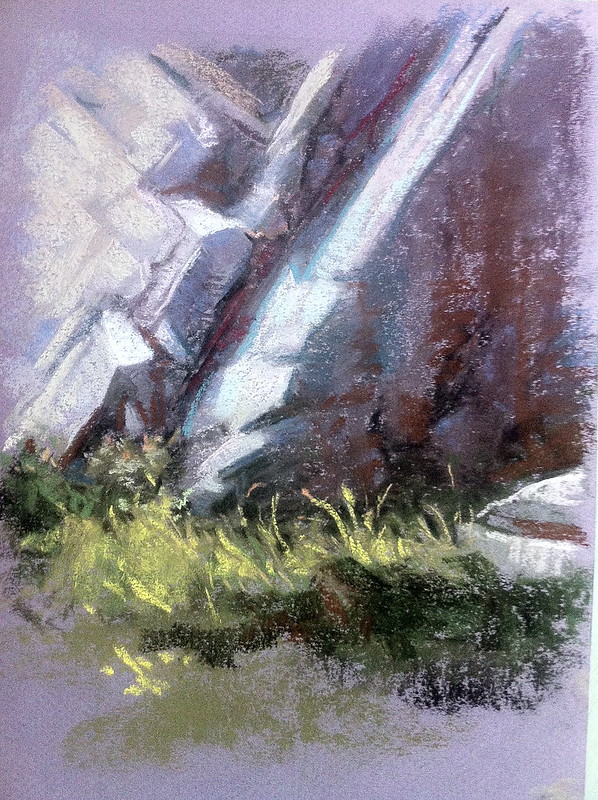
Switching back to pastels, I decided to turn around, move down the beach and paint a close up study of this rock face and shadow. The rock had a blue-grey local color and in the shadow side had some oxidization that made rich brown patterns along the cracks. The entire time I was painting the main deep shadow of the rock I could barely wait to paint in those wisps of grass in the light. When I finally put those little lights in, it was like going to the circus!
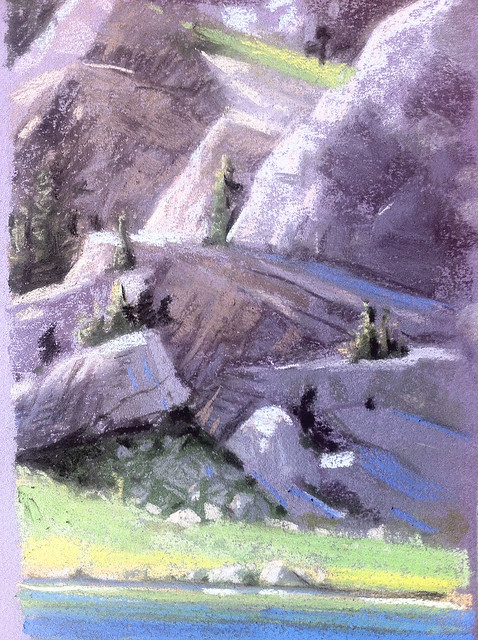
I tried a longer view from across the lake. I had to work very quickly on this one since the shadow and reflected light was changing by the minute, it seemed. The triangle of shadow at the bottom was filled with cool deep greens while the shadows above had warm light bouncing into cool shadows.
The amazing thing about the Sierras, at least the Minarets and Lake Ediza, is the reflected light. I found it quite difficult to paint such bright bounce light in the shadows, always thinking to myself that no one would believe my painting if I painted what I saw in front of me. It was challenging to keep the reflected light within a value range that was in keeping within the shadow while also trying to define form. I've always found rocks and boulders challenging more so than other subjects for this reason.
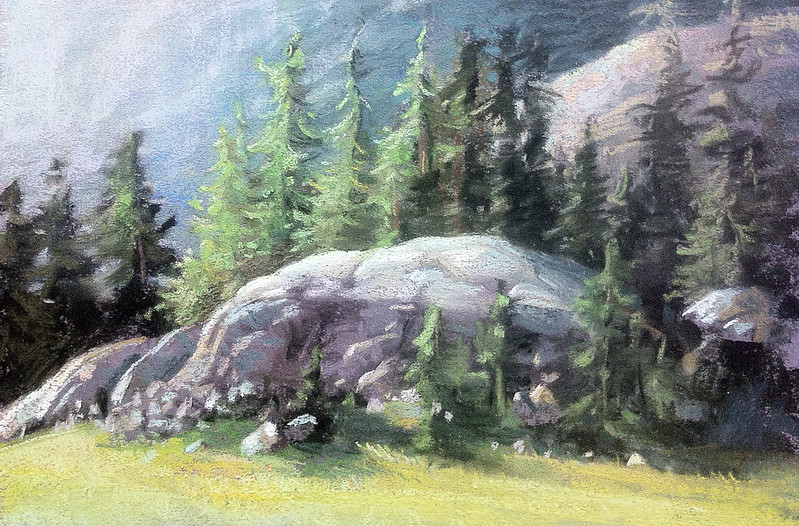
I am so fortunate to have spent time amongst the Minarets with this band of talented mountain loving artists. What made it so deeply enjoyable was the kinship with fellow artists who were all equally enthusiastic about painting. As we sat around the dinner table while Kelly cooked we all talked about what we painted that day, the places we explored and the light we saw.
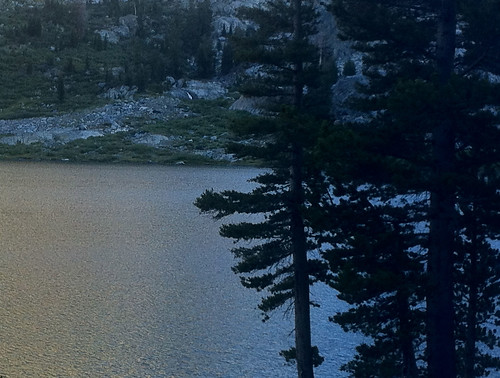
The light at dusk was just stunning, absolutely my favorite lighting of all, the time of day when all of the color is blanketed in a blue grey bath. Apparently I wasn't the only one interested in this; right after dinner each night, Eric Merrell would begin to set up his pochade box for some nocturne sketching. He had an excellent night time set up with little led lights on his palette that were perfect for illumination and did not blow out the light when you looked up at the dark scene in the distance.
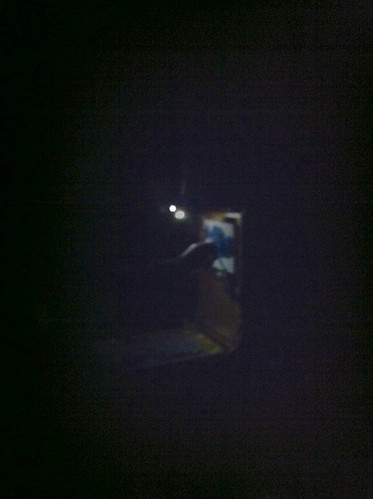
Eric painting around 9:00. Although you can't see it in this photo, the moon was quite bright, illuminating the landscape and flooding it with warm and cool grey light.
I attempted a nocturne, but quickly learned that in order to do it well I needed a much better lighting set up. Every time I looked down at my palette with my headlamp to locate a color I wanted, I would look up and find my eyes completely unadjusted to the light making everything in sight a giant silhouette. I tried using a dim book light on my palette instead which was an improvement, but then had problems locating the colors I wanted to use. Below is my result, for better or worse.
However, I did indeed learn A LOT by making the attempt. Not only would I come with tiny LED lights like Eric's, but I'd lay out a limited palette ahead of time full of cool blues, neutral greys, and even warm greys and a few rich violets too.
The sky was so rich, full of violet and ult blue. I also vividly remember a thin sliver of very warm yellow value 2 light on the outer lighted edge of the moon - very surprising since the rest of the moon looked cooler in the light.
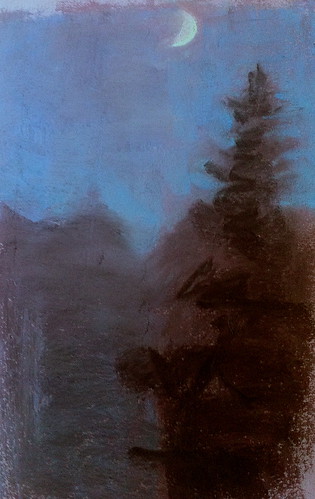
Besides developing a nocturnal lighting obsession, I became completely enamored by the lighting around waterfalls that were close to our camp. These areas were typically surrounded by rocks that when wet became a deep brownish color, almost black in some areas. This looked really stunning against the white water washing down around them and the green patches of vegetation nearby.
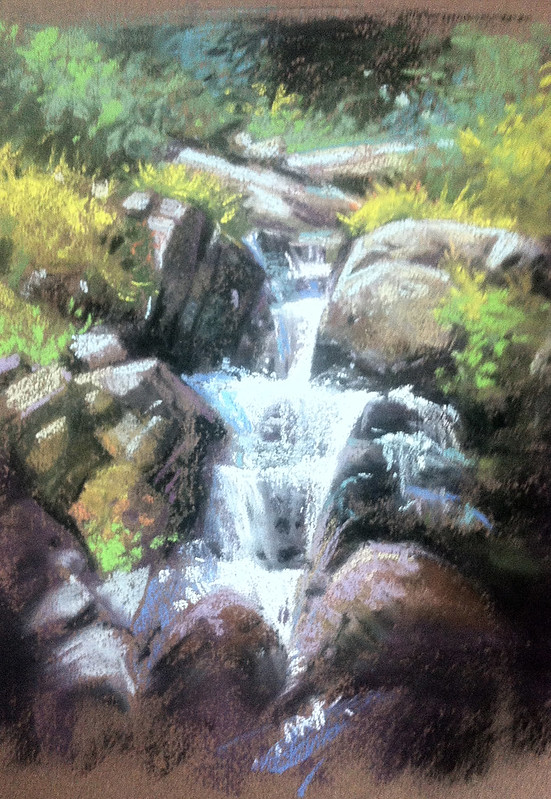
I felt like one day's time was not enough to study this waterfall area. I really want to go back and spend a full week exploring the light and color of this incredible dynamic.
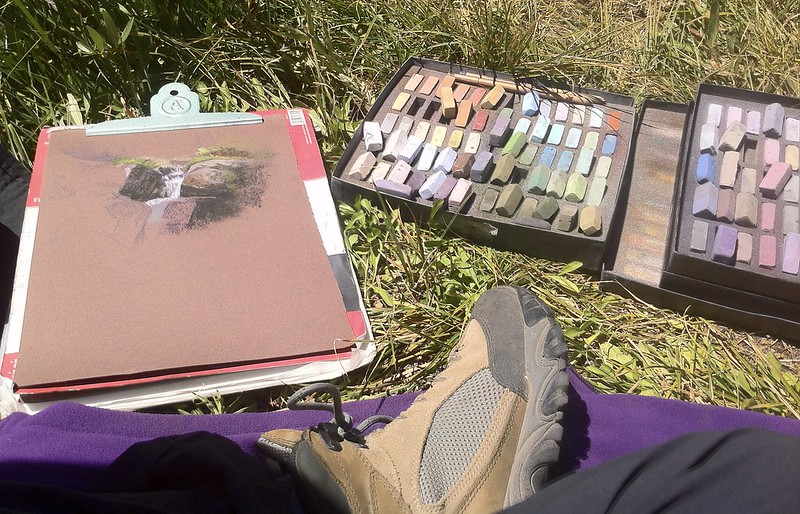
There is something about the mountains. When I was a little girl, my father, a Captain in the Army, was stationed at Fort Carson, Colorado. It was just outside of Fort Carson that I spent every weekend learning to ride horses, became obsessed with wildlife, the mountains, the air, the snow, the birds, horses, and hiking.
I am so fortunate to have spent such sacred time with fellow artists and friends in the Sierras. I really could do this forever!
****************************
Lake Ediza was our destination, a steep hike up from about 7,000 feet to around 10,000 at the lake. As we hiked up from the Agnew Meadows pack station where we dropped off our gear for the mules to carry up, I was floored by the incredible views along the rocky trail as I breathlessly made my way up slower than my group, despite the conditioning/training I did a few months before the trip.

Our mule train arriving after a long hike up to Lake Ediza. Eric Merrell on the far right on top of a boulder.

I set up my tent just under a tree, situated rather close to our cook's food storage/prep area due to the view of the Minarets from my tent. Given that we had a 4:00 am bear visit to the camp site, I think in the future I'd place my tent much farther away from the food source. I'm sure the view was just as magnificent a little further away.

Zipping down the front flap to my tent each morning gave me the most amazing view! I did a few little pencil sketches from my tent in the mornings but mostly sipped coffee while staring at the mountains and feeling like all was right with the world. Probably not the most efficient use of my painting time, but deeply enjoyable nonetheless.
Before I went on the trip I planned out how I would approach the week of painting. I intended to sketch out a couple of long shots, a few medium and a couple of close up intimate scenes so that I could create a portrait of the area from large scale to the very small.
What I hadn't counted on though was how much the altitude seemed to factor into my experience within the first 24-48 hours. After we got up to Lake Ediza from a long and difficult climb up to almost 10,000 feet elevation, I found that even after a long rest and some water that my heart was beating quite fast. I tried my best to ignore it, but my worry distracted me and I didn't paint very well the first day.

After the first 24 or so hours, my heart slowed to it's usual pace and I felt pretty comfortable. Still, I decided to stay close to camp to further acclimate to the elevation. While my camp mates were hiking up steep terrain in pursuit of painting gargantuan landscapes, I crawled along a stream bed close by looking for miniature wildflower compositions.

I attempted several minute scenes, but these two are my favorites of the lot. Most of these tiny compositions were along stream banks underneath tree growth bathed in beautiful cool sunlight with reflected light bouncing in and deep warm shadows. The pastel set I brought did not have a yellow that was as bright and pure as the yellow I saw in the light, so I tried my best to layer a few colors together and tried adding some transition color along the edges in order to brighten the color.

I also had some fun playing with the outside edges of the compositions, layering blue and accenting the edges with an emerald green. These little compositions reminded me a lot of the kind of watercolor paintings I did a lot of in my 20's. I would really like to get some hot press watercolor paper and do some more of these little flower studies.
In keeping my goals, I decided to venture further away from camp in order to attempt a long shot landscape. I found a bank of trees at the opposite end of Ediza near to where we hiked in and made myself comfortable by the lake shore in a shady spot. I always enjoy large view paintings but do find them daunting at times. Part of the reason for this is probably technical on my part; I feel the need to hang out in one area until I get the entire area correct in terms of value, hue, and saturation before moving on to anything else. This I am sure is due in part to the lessons I learned early on at the Palette and Chisel via Richard Schmid, who often lectured about the importance of getting everything correct within the focal point first. It is entirely possible that I misunderstood his point, but still, there it is, imprinted on my art mind forever and the way I've approached painting since I was 19.
Bill must have wondered what the heck was going on because at one point he came up to me and said, "Commit Julia! Commit!" I had to laugh because I knew exactly what he meant. From that point on I told myself over and over, "stop the bullshit and lay in some more color!!!" I did find it helpful to stop lingering as much as I was in my focal point and get some more color down.


What attracted to me to this grouping of trees was the deep shadow within the bank of trees at the bottom. I liked the way the shape looked and liked how it was juxtaposed against warm and cool greens in the light. I'm not sure this photograph picked up the variety of color in the shadow very well, unfortunately.
Also, while I painted the mountain in the far distance behind the bank of evergreens, I noticed that the colors were muted variations of reds and greens, a color scheme I saw near the foothills of Zion National Park in Southern Utah. I wondered if these mountains have some of the same elements.
Switching to oil, I wanted to make a few studies of the light on rocks down by the water. I was attracted to the color in the shadows on the rocks - just jam packed with rich color that made it really fun to paint.

However, this simple study was more challenging than it might look. I'd look down to mix up some color, look up, and all of the sudden the temperature in the light was completely different! I decided it was probably due in part to the reflection of the shimmering light coming off of the water from Lake Ediza. This one is also on Arches oil paper. I layered the paint thicker in this study to compensate for the absorbency of the paper which seemed to make my values at least a full value darker about ten minutes after I laid down the paint. I did another few studies of the Minarets but became frustrated with the oil paper. I think I'll switch back to my usual L219 new traditions panels for oil studies.

Switching back to pastels, I decided to turn around, move down the beach and paint a close up study of this rock face and shadow. The rock had a blue-grey local color and in the shadow side had some oxidization that made rich brown patterns along the cracks. The entire time I was painting the main deep shadow of the rock I could barely wait to paint in those wisps of grass in the light. When I finally put those little lights in, it was like going to the circus!

I tried a longer view from across the lake. I had to work very quickly on this one since the shadow and reflected light was changing by the minute, it seemed. The triangle of shadow at the bottom was filled with cool deep greens while the shadows above had warm light bouncing into cool shadows.
The amazing thing about the Sierras, at least the Minarets and Lake Ediza, is the reflected light. I found it quite difficult to paint such bright bounce light in the shadows, always thinking to myself that no one would believe my painting if I painted what I saw in front of me. It was challenging to keep the reflected light within a value range that was in keeping within the shadow while also trying to define form. I've always found rocks and boulders challenging more so than other subjects for this reason.

I am so fortunate to have spent time amongst the Minarets with this band of talented mountain loving artists. What made it so deeply enjoyable was the kinship with fellow artists who were all equally enthusiastic about painting. As we sat around the dinner table while Kelly cooked we all talked about what we painted that day, the places we explored and the light we saw.

The light at dusk was just stunning, absolutely my favorite lighting of all, the time of day when all of the color is blanketed in a blue grey bath. Apparently I wasn't the only one interested in this; right after dinner each night, Eric Merrell would begin to set up his pochade box for some nocturne sketching. He had an excellent night time set up with little led lights on his palette that were perfect for illumination and did not blow out the light when you looked up at the dark scene in the distance.

Eric painting around 9:00. Although you can't see it in this photo, the moon was quite bright, illuminating the landscape and flooding it with warm and cool grey light.
I attempted a nocturne, but quickly learned that in order to do it well I needed a much better lighting set up. Every time I looked down at my palette with my headlamp to locate a color I wanted, I would look up and find my eyes completely unadjusted to the light making everything in sight a giant silhouette. I tried using a dim book light on my palette instead which was an improvement, but then had problems locating the colors I wanted to use. Below is my result, for better or worse.
However, I did indeed learn A LOT by making the attempt. Not only would I come with tiny LED lights like Eric's, but I'd lay out a limited palette ahead of time full of cool blues, neutral greys, and even warm greys and a few rich violets too.
The sky was so rich, full of violet and ult blue. I also vividly remember a thin sliver of very warm yellow value 2 light on the outer lighted edge of the moon - very surprising since the rest of the moon looked cooler in the light.

Besides developing a nocturnal lighting obsession, I became completely enamored by the lighting around waterfalls that were close to our camp. These areas were typically surrounded by rocks that when wet became a deep brownish color, almost black in some areas. This looked really stunning against the white water washing down around them and the green patches of vegetation nearby.

I felt like one day's time was not enough to study this waterfall area. I really want to go back and spend a full week exploring the light and color of this incredible dynamic.

I am so fortunate to have spent such sacred time with fellow artists and friends in the Sierras. I really could do this forever!
****************************